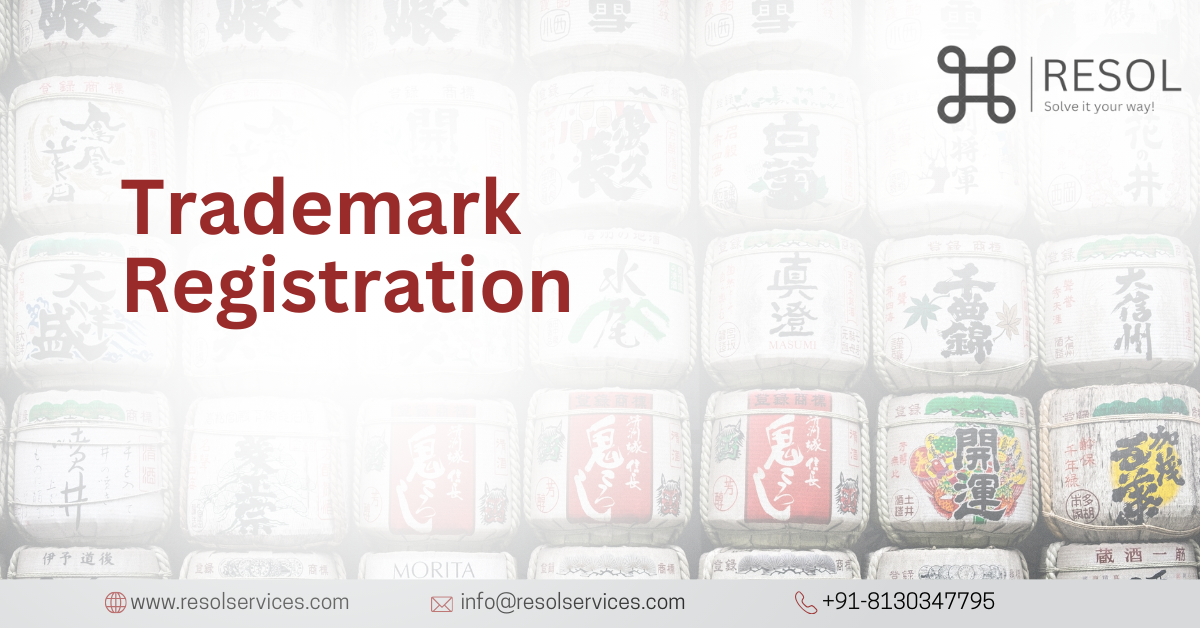Introduction
The Trademarks Registry was established in India in 1940, which currently administers the Trademarks Act, 1999. The main objective of the Trademarks Act, 1999 is to register trademarks which qualify for registration under the designated Act & Rule. The Trademarks Act,1999 also provides for protection of the trademark for goods and services and prevents the fraudulent use of the trade mark. The exclusive rights of the usage of trademark are only given to its owner, under whose name the trademark has been registered.
Trademarks are classified under Intellectual Property, hence they are protected from any kind of infringement. A trademark can be a word, name, sound, symbol, logo etc. Trademark registration is necessary as it distinguishes your product or service from your competitors. Therefore, registration of trademark prevents any kind of misrepresentation or copying / impersonation of your mark. Trademarks helps in providing recognition and building a brand value in the market which also creates a premium image of the brand among the consumers. All big brands nowadays have their own registered trademark such as the iconic bitten apple logo of Apple Inc. and the tick or “swoosh” in the Nike logo are examples of trademark.
Documents Required
1. Trademark Application Form (Form TM-A): This is the primary form to initiate the registration process.
2. Power of Attorney (PoA): If you are getting your trademark registered by a trademark agent or attorney, they will need a Power of Attorney signed by you, authorizing them to act on your behalf.
3. Proof of Identity and Address of the Signatory: This includes documents like Aadhaar Card, Passport, or Voter ID, to verify the identity of the person signing the application.
4. Trademark Specimen: A clear representation of the trademark, including the logo, symbol, or wordmark you wish to register.
5. User Affidavit (if applicable): If you claim to have been using the trademark before the application date, you’ll need to provide a user affidavit and supporting documents.
For Companies (Private Limited, OPC, LLP, Public Limited, Partnership, etc.):
6. Certificate of Incorporation or Registration: Proof of the company’s or partnership’s legal existence.
7. Identity proof of the Authorised Signatory of the organization
8. Address proof of the Authorised Signatory of the organization
9. Udyog Aadhar Registration Certificate (optional)
Documents may vary according to the applicant; in the case of individuals, companies, partnerships.
Registration Process
Trademark registration in India is governed by the Trade Marks Act, 1999, and is administered by the Office of the Controller General of Patents, Designs and Trade Marks (CGPDTM). The following steps are to be followed to successfully register a Trademark:
1. Trademark Search: Before filing an application make sure to conduct a thorough search of the Indian Trademark Registry database to ensure that your proposed trademark is unique and not already in use.
Use the Intellectual Property India’s Trademark Search Portal to check for existing trademarks.
2. Choosing a Unique Mark: Select a trademark that is distinctive, unique, and not descriptive of the goods or services.
Consider the potential for the mark to be easily recognizable and memorable.
3. Trademark Classification: Determine the appropriate class for your goods or services based on the Niche Classification. This classification helps in organizing trademarks and prevents confusion between similar products or services.
4. Filing the Trademark Application: Fill out Form TM-A, which is the official application form for trademark registration. You can file the application online through the Intellectual Property India’s e-filing portal or offline by visiting the Trademark Registry office.
Ensure you have all the required documents which are mentioned above, such as address proof, ID proof, and a signed power of attorney (if applicable).
5. Trademark Examination: After the application is filed, the Trademark Registrar will examine it to ensure it meets all legal requirements. The examination process includes checking for any prior trademarks, any potential conflicts, and compliance with trademark laws.
If the examiner finds any issues, they will issue a notice of objection, and the applicant has a chance to respond.
6. Publication in the Trademark Journal: If the trademark application is accepted, it will be published in the Trademark Journal for a period of time.
This allows third parties to oppose the registration if they believe their rights are being infringed.
7. Opposition Period: During the publication period, anyone can file an opposition to the trademark registration if they believe there is a conflict with their existing trademark rights.
The applicant must respond to any opposition filed within the prescribed time period.
8. Registration and Certificate: If no opposition is filed or if any opposition is resolved, the trademark will be registered, and a registration certificate will be issued.
The registration certificate grants the trademark owner exclusive rights to use the trademark in connection with the specified goods or services.
9. Renewal: Trademark registration is valid for 10 years from the date of registration and can be renewed for further periods of 10 years.
The official fees for filing a trademark application (Form TM-A) vary based on the applicant type and the mode of filing:
| Applicant Type | E-filing (per class) | Physical Filing (per class) |
| Individuals, Startups, Small Enterprises | ₹ 4,500 | ₹ 5,000 |
| Companies and Other Entities | ₹ 9,000 | ₹ 10,000 |
How we will Help you?
The trademark registration process can be a confusing one specially if you are applying on your own because of the already existing marks which are registered under the owners, as well as an objection can be failed against the application if it is not filled as per the set Rules and Act. We assure you that your registration process will be made pleasant with end-to-end assistance from our qualified team. Below are some ways in which we can support you during your Trademark registration.
1. Trademark Search and Clearance: We as a company have the tools and expertise to conduct thorough trademark searches beyond basic online searches. We analyze the Trademark Registry database, including word marks, logos, and phonetic similarities, to identify potential conflicts that might lead to an objection or rejection of registration.
2. Possibility Assessment: We provide a professional opinion on the possibility of registration of your proposed mark based on the search findings and understanding of trademark laws. We will help you choose a unique and legally sound trademark.
3. Trademark Classification: We also assist in correctly identifying the appropriate class(es) under the Niche Classification for your services. This is very crucial as applying under the wrong class can lead to rejection or inadequate protection of your mark.
4. Assistance in Application filing: We help to gather and prepare all the necessary documents for the application, ensuring they are complete and in the correct format. This includes the application form (TM-A), identity and address proofs, business registration documents, logo, and power of attorney.
5. Responding to examination & oppositions: We track the progress of your application and inform you of any updates or official communications from the Trademark Registry related to your application. If the examiner raises objections, we analyze the report, and form a legal and strategic response and file it on your behalf within the stipulated time. If your trademark faces opposition, we also help you prepare and file a counter-statement and represent you in the opposition proceedings.
6. Post-Registration Services: We keep on reminding you periodically that when your trademark registration is about to expire and provide assistance with filing the renewal application (Form TM-R) to maintain continuous protection of your trademark.
We ensure on our end that you get your trademark registered with utmost ease and comfort and at the same time get maximum legal protection of the same.
FAQs
1. How long is a Trademark registration valid?
A trademark registration is valid for 10 years, after that it has to be renewed.
2. Who is eligible for a trademark registration in India?
Any individual, company, partnership firm, trust, NGO, or even a foreign entity—can apply for a trademark. If you’re an individual, you can also apply in your personal name.
3. When can the ® symbol be used?
You can use the ® (Registered) symbol only after your trademark is officially registered. Before that, you may use ™ (Trademark) to indicate that you’ve applied.
4. Is the trademark valid internationally?
No, a trademark registered in India is only valid within India. For international protection, you can apply via the Madrid Protocol.
5. How long does it take to register a trademark in India?
Without an objection/opposition, a trademark registration can take 6 to 8 months, in the case of objections/oppositions, it may take 1–2 years or more.

